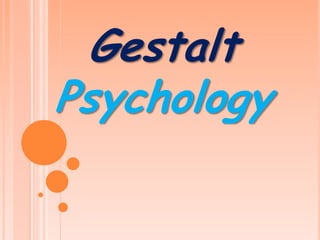
Final
- 2. means “form” or “configuration” Psychologists like Max Wertheimer, Wolfgang Kohler and Kurt Koffka, studied perception and concluded that the „learners were not passive , but rather active. They suggested that learners do not just collect information but they actively process and restructure data in order to understand it. This called perceptual process. Like past experience, needs, attitudes and one‟s present situation can affect his/her perception.
- 3. GESTALT THEORY was the initial response of behaviorism. this emphasized the importance of sensory wholes and the dynamic nature of visual perception. According to the Gestalt Psychologist » the way we form our perception are guided by certain principles or laws.
- 5. LAW OF PROXIMITY this are the objects near each other or closer together that tend to be grouped together.
- 6. LAW OF SIMILARITY elements that look similar we perceived as part of the same form.
- 7. LAW OF CLOSURE objects grouped together are seen as a whole.
- 8. LAW OF GOOD CONTINUATION holds the points that are connected by straight or curving lines are seen in a away that the smoothest path, rather than seeing separate lines and angles, lines are seen that are belonging together.
- 9. LAW OF GOOD PRAGNANZ the word pragnanz a German term meaning “good figure”. The law of pragnanz is sometimes referred to as law of good figure or law of simplicity. This hold that objects in the environment are seen in a way that makes them appear as simple as possible.
- 10. LAW OF FIGURE/GROUND we pay attention and perceived things in the foreground first. A stimulus will be perceived as separate from its ground. (by Jenny Fultz of Anderson University)
- 11. INSIGHT LEARNING Wolfgang Kohler was the first psychologist who developed the insight learning in which he described an experiments with apes could use boxes and sticks as tools to solve problem.
- 12. in the box problem, the banana is attached to the top of a chimpanzee‟s cage. The banana is out of reach but can be reached by climbing upon and jumping from a box. Only one of Kohler‟s apes(Sultan)could solve this problem. A much more difficult problem was involved the stacking of boxes was introduced by Kohler. This problem required the ape to stack one box on another , and master gravitational problems by building a stable stack. Kohler also gave the apes sticks which they use t rake food into the cage. Sultan, Kohler„s very intelligent ape, was able to master a two-stick problem by inserting ne stick into the end of the other in order to reach the food.
- 13. the important aspect of learning was not reinforcement, but the coordination of thinking to create new organizations. Kohler referred to this behavior as insight or
- 14. GESTALT PRINCIPLES AND TEACHING-LEARNING PROCESS thissix Gestalt Principles not only influence perception but also they impact on learning. * Kurt Lewin • his theory focusing on “life space adhered to gestalt psychology. • he said that an individual has inner and outer forces that affect his perception and also his learning.
- 15. Inner Forces include hid own motivation, attitudes and feelings. Outer Forces include the attitude and behavior of the teacher and classmates.
- 16. MARIO POLITO » italian psychologist writes about the relevance of Gestalt Psychology to education.
- 17. • Gestalt theory is focused on the experience of contact that occurs in here and now. It considers with interest the life space of teachers as well as students. It takes interest in the complexity of experience, without neglecting anything, but accepting and amplifying all that emerges. It stimulates learning as experience and the experience as a source of learning. It appreciates the affections and meaning that we attribute to what we learn.
- 18. . Knowledge is conceived as continuous organization and rearrangement of information according to needs, purposes and meanings. It asserts that learning is not accumulation, but remodeling or insight. Autonomy and freedom of the student is stimulated by the teacher. The time necessary for assimilation and for cognitive and existential remodeling is respected. The contact experience between teacher and students is given value : an authentic meeting based on sharing ideas and affections.
